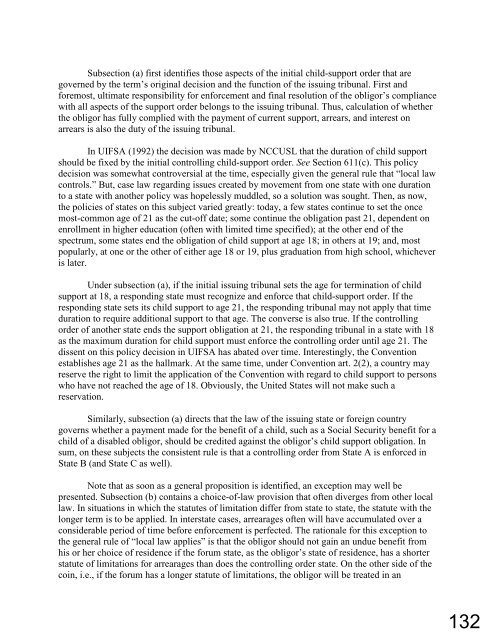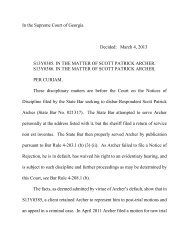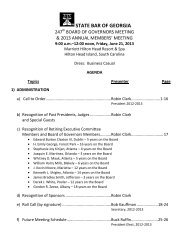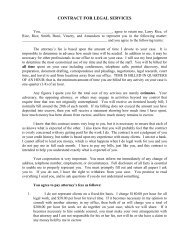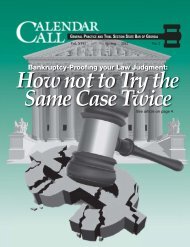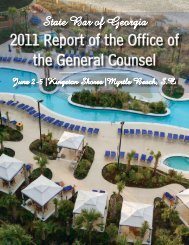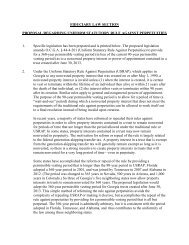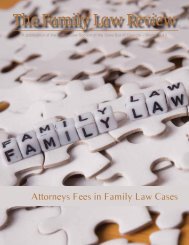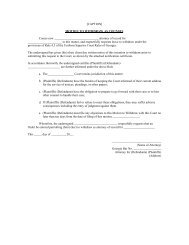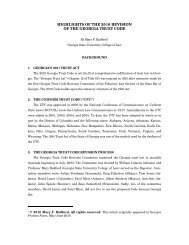2008 Amendments to the Uniform Interstate Family Support Act ...
2008 Amendments to the Uniform Interstate Family Support Act ...
2008 Amendments to the Uniform Interstate Family Support Act ...
You also want an ePaper? Increase the reach of your titles
YUMPU automatically turns print PDFs into web optimized ePapers that Google loves.
Subsection (a) first identifies those aspects of <strong>the</strong> initial child-support order that are<br />
governed by <strong>the</strong> term’s original decision and <strong>the</strong> function of <strong>the</strong> issuing tribunal. First and<br />
foremost, ultimate responsibility for enforcement and final resolution of <strong>the</strong> obligor’s compliance<br />
with all aspects of <strong>the</strong> support order belongs <strong>to</strong> <strong>the</strong> issuing tribunal. Thus, calculation of whe<strong>the</strong>r<br />
<strong>the</strong> obligor has fully complied with <strong>the</strong> payment of current support, arrears, and interest on<br />
arrears is also <strong>the</strong> duty of <strong>the</strong> issuing tribunal.<br />
In UIFSA (1992) <strong>the</strong> decision was made by NCCUSL that <strong>the</strong> duration of child support<br />
should be fixed by <strong>the</strong> initial controlling child-support order. See Section 611(c). This policy<br />
decision was somewhat controversial at <strong>the</strong> time, especially given <strong>the</strong> general rule that “local law<br />
controls.” But, case law regarding issues created by movement from one state with one duration<br />
<strong>to</strong> a state with ano<strong>the</strong>r policy was hopelessly muddled, so a solution was sought. Then, as now,<br />
<strong>the</strong> policies of states on this subject varied greatly: <strong>to</strong>day, a few states continue <strong>to</strong> set <strong>the</strong> once<br />
most-common age of 21 as <strong>the</strong> cut-off date; some continue <strong>the</strong> obligation past 21, dependent on<br />
enrollment in higher education (often with limited time specified); at <strong>the</strong> o<strong>the</strong>r end of <strong>the</strong><br />
spectrum, some states end <strong>the</strong> obligation of child support at age 18; in o<strong>the</strong>rs at 19; and, most<br />
popularly, at one or <strong>the</strong> o<strong>the</strong>r of ei<strong>the</strong>r age 18 or 19, plus graduation from high school, whichever<br />
is later.<br />
Under subsection (a), if <strong>the</strong> initial issuing tribunal sets <strong>the</strong> age for termination of child<br />
support at 18, a responding state must recognize and enforce that child-support order. If <strong>the</strong><br />
responding state sets its child support <strong>to</strong> age 21, <strong>the</strong> responding tribunal may not apply that time<br />
duration <strong>to</strong> require additional support <strong>to</strong> that age. The converse is also true. If <strong>the</strong> controlling<br />
order of ano<strong>the</strong>r state ends <strong>the</strong> support obligation at 21, <strong>the</strong> responding tribunal in a state with 18<br />
as <strong>the</strong> maximum duration for child support must enforce <strong>the</strong> controlling order until age 21. The<br />
dissent on this policy decision in UIFSA has abated over time. Interestingly, <strong>the</strong> Convention<br />
establishes age 21 as <strong>the</strong> hallmark. At <strong>the</strong> same time, under Convention art. 2(2), a country may<br />
reserve <strong>the</strong> right <strong>to</strong> limit <strong>the</strong> application of <strong>the</strong> Convention with regard <strong>to</strong> child support <strong>to</strong> persons<br />
who have not reached <strong>the</strong> age of 18. Obviously, <strong>the</strong> United States will not make such a<br />
reservation.<br />
Similarly, subsection (a) directs that <strong>the</strong> law of <strong>the</strong> issuing state or foreign country<br />
governs whe<strong>the</strong>r a payment made for <strong>the</strong> benefit of a child, such as a Social Security benefit for a<br />
child of a disabled obligor, should be credited against <strong>the</strong> obligor’s child support obligation. In<br />
sum, on <strong>the</strong>se subjects <strong>the</strong> consistent rule is that a controlling order from State A is enforced in<br />
State B (and State C as well).<br />
Note that as soon as a general proposition is identified, an exception may well be<br />
presented. Subsection (b) contains a choice-of-law provision that often diverges from o<strong>the</strong>r local<br />
law. In situations in which <strong>the</strong> statutes of limitation differ from state <strong>to</strong> state, <strong>the</strong> statute with <strong>the</strong><br />
longer term is <strong>to</strong> be applied. In interstate cases, arrearages often will have accumulated over a<br />
considerable period of time before enforcement is perfected. The rationale for this exception <strong>to</strong><br />
<strong>the</strong> general rule of “local law applies” is that <strong>the</strong> obligor should not gain an undue benefit from<br />
his or her choice of residence if <strong>the</strong> forum state, as <strong>the</strong> obligor’s state of residence, has a shorter<br />
statute of limitations for arrearages than does <strong>the</strong> controlling order state. On <strong>the</strong> o<strong>the</strong>r side of <strong>the</strong><br />
coin, i.e., if <strong>the</strong> forum has a longer statute of limitations, <strong>the</strong> obligor will be treated in an<br />
132


